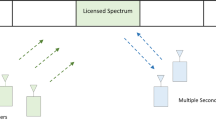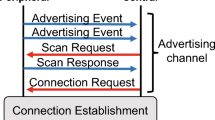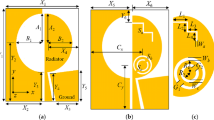Abstract
Spectrum sensing and spectrum allocation are the two important concerns of a cognitive radio network (CRN). The energy detection approach uses a dual estimation in sensing of spectrum availability. The energy detection considers the channel as a noised or signals with noise as two probable conditions in spectrum sensing. Here, the estimation is defined by the threshold limit defined by the estimate under a prior interference level. The estimate is however not optimal in the current channel estimate due to the dynamic nature of the channel. The coordinative property of the channel has a greater impact on the estimation performance. To develop an estimation approach using the channel characteristic a new weight updation using the SNR metric is proposed. The suggested approach defines the constructive signal estimation under coordinative and non-coordinative channel conditions. The proposed approach ROA defines a new weight updation giving faster converges, higher throughput, and higher accuracy in estimates.










Similar content being viewed by others
References
Ahmed A, Hu YF, Noras JM (2014) Noise variance for spectrum sensing in cognitive radio networks. AASRI procedia, Elsevier, 37–43
Anandakumar H, Arulmurugan R, Onn CC (2019) Computational Intelligence and Sustainable Systems. In: EAI/Springer Innovations in Communication and Computing
Chartrand R, Staneva V(2008). Restricted isometry properties and nonconvex compressive sensing. Inverse Problems, 24
Filandras P, Wong K, Zhang Y (2015) Informed Scheduling by Stochastic Residual Belief Propagation in Distributed Wireless Networks. IEEE Wirel Commun Lett, 4, No. 1
Fourat H, Cheng-Xiang W, Harald H, Erol H, Xiaohu G, Dongfeng Y (2015) Spectral and Energy Efficiency Analysis for Cognitive Radio Networks. IEEE Trans Wirel
Himanshu P, Singh A (2015) Fault Tolerant Spectrum Assignment in Cognitive Radio Networks. Procedia Computer Science, Elsevier, 1188–1195
Jacob J, Jose B, Mathew J (2015) A Fuzzy Approach to Decision Fusion in Cognitive Radio. Elsevier, 425–431
Jia R, Jhang J, Yang F, Gan X (2015) Throughput and delay in heterogeneous cognitive radio networks with cooperative secondary users. IEEE Trans Parallel Distrib Syst 26:9
Koradali AV, Cottis PG (2015) A contract-based spectrum trading scheme for cognitive radio networks enabling hybrid access. IEEE Access, 3:1531–1540.
Lee WY, Akyildiz IF (2012) Spectrum-aware mobility management in cognitive radio cellular networks. IEEE Trans Mob Comput 11:4
Mabrook MM, Taha HA, Hussein AI(2020). “Cooperative spectrum sensing optimization based adaptive neuro-fuzzy inference system (ANFIS) in cognitive radio networks. J Ambient Intell Hum Comput
Pandeeswari G, Suganthi M, Asokan R2020). Performance of single- hop and multi-hop relaying protocols in cognitive radio networks over Weibull fading channel. J Ambient Intell Hum Comput
Ping S, Aijaz A, Holland O, Aghvami AH (2015) SACRP: a spectrum aggregation-based cooperative routing protocol for cognitive radio Ad-Hoc networks. IEEE Trans Commun 63:6
Qin Z, Gao Y, Parini CG (2016) Data-Assisted Low Complexity Compressive Spectrum Sensing on Real-Time Signals under Sub-Nyquist Rate. IEEE Trans Wirel Commun 15(2)
Radio Architectures. Procedia Computer Science, Elsevier, 1156–1163
SadeghianKerdabadi M, Ghazizadeh R, Farrokhi H (2019) Energy consumption minimization and throughput improvement in cognitive radio networks by joint optimization of detection threshold, sensing time and userselection. Wirel Netw 25:2065–2079
SaiSuneel A, Shiyamala S (2020) Peak detection based energy detection of a spectrum under Rayleigh fading. J Ambient Intell Hum Comput
Shen Y, Kwak Y (2014). Robust Power Control for Cognitive Radio Networks with Proportional Rate Fairness. The Korean Institute of Communications and Information Sciences(KICS)
Song Y, Xie J (2014) QB2IC:A QoS-based broadcast protocol under blind information for multihop cognitive radio Ad Hoc networks. IEEE Trans Veh Technol 63(3):1980–1997
Srikanth M, Murthy R,G (2015) Towards faster spectrum sensing techniques in cognitive
Tang M, Xin Y (2016) Energy efficient power allocation in cognitive radio network using coevolution chaotic particle swarm optimization”chaotic particle swarm optimization. Computer Networks, Elsevier, 1–11
Wang S, Shi W, Wang C (2015) “Energy-Efficient Resource Management in OFDM-based Cognitive Radio Networks under Channel Uncertainty. IEEE Trans Commun, 63
Yang J, Zhao H (2015) Enhanced throughput of cognitive radio networks by imperfect. IEEE Commun Lett 19:10
Zhang X, Ma Y, Gao Y, Cui S (2018) Real-time adaptively regularized compressive sensing in cognitive radio networks. IEEE Trans Veh Technol 67:2
Author information
Authors and Affiliations
Corresponding author
Additional information
Publisher’s note
Springer Nature remains neutral with regard to jurisdictional claims in published maps and institutional affiliations.
Rights and permissions
About this article
Cite this article
Arikatla, J.L., Swamy, G.N. & Prasad, M.N.G. Dynamic Coordinative Estimation Enhancement in Cognitive Radio Network. J Ambient Intell Human Comput 13, 1125–1136 (2022). https://doi.org/10.1007/s12652-021-02935-1
Received:
Accepted:
Published:
Issue Date:
DOI: https://doi.org/10.1007/s12652-021-02935-1




